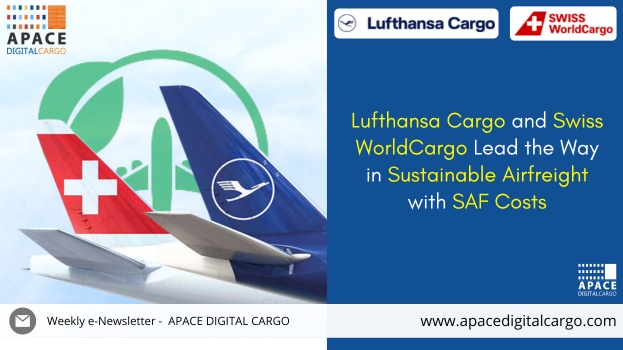
Lufthansa Cargo and Swiss WorldCargo, both part of the Lufthansa Group, have announced plans to integrate the cost of Sustainable Aviation Fuel (SAF) into their Airfreight Surcharge (ASC)
Starting January 1, 2025. This adjustment will initially include a 2% SAF blending quota for flights departing from European Union (EU) countries, aligning with the EU’s RefuelEU initiative, which mandates the use of SAF in fuel uplift starting from 2025.
The SAF quota is set to gradually increase, reaching 6% by 2030 and 70% by 2050, as part of the broader European Commission’s ‘Fit for 55’ initiative aimed at reducing emissions by 55% by 2030, compared to 1990 levels. Other countries are also preparing for similar SAF regulations, including India, which plans to implement a 1-5% SAF quota starting in 2027, and Singapore, which will require 1% SAF in fuel uplift from Changi Airport by 2026, with a target of 3-5% by 2030. The UK and Japan will mandate 10% SAF by 2030.
Lufthansa Cargo emphasized that the aviation industry alone cannot create a competitive SAF market and called for government support. The airline highlighted that SAF, particularly biogenic SAF, is currently produced in small quantities and is 3-5 times more expensive than traditional fossil fuels. A strategic policy framework is needed to boost SAF availability, increase supply volumes, and reduce costs to meet future blending rates.
Lufthansa Cargo and Swiss WorldCargo introduced the ASC in 2015 to offset additional costs that individual airlines cannot control, such as rising fuel prices, currency fluctuations, and security costs. The surcharge is calculated using a standardized index system, allowing for adjustments based on cost changes. The ASC is added to the net price of shipments, although local regulations may affect how it is applied in certain countries.
Both Lufthansa Cargo and Swiss WorldCargo remain committed to reducing their environmental impact, with the Lufthansa Group aiming for carbon neutrality by 2050. By 2030, the group plans to halve its net CO₂ emissions compared to 2019 levels. Customers are also offered emissions reduction and offset services through Lufthansa Cargo’s ‘Sustainable Choice’ and Swiss WorldCargo’s ‘Green Choice’ programs.





